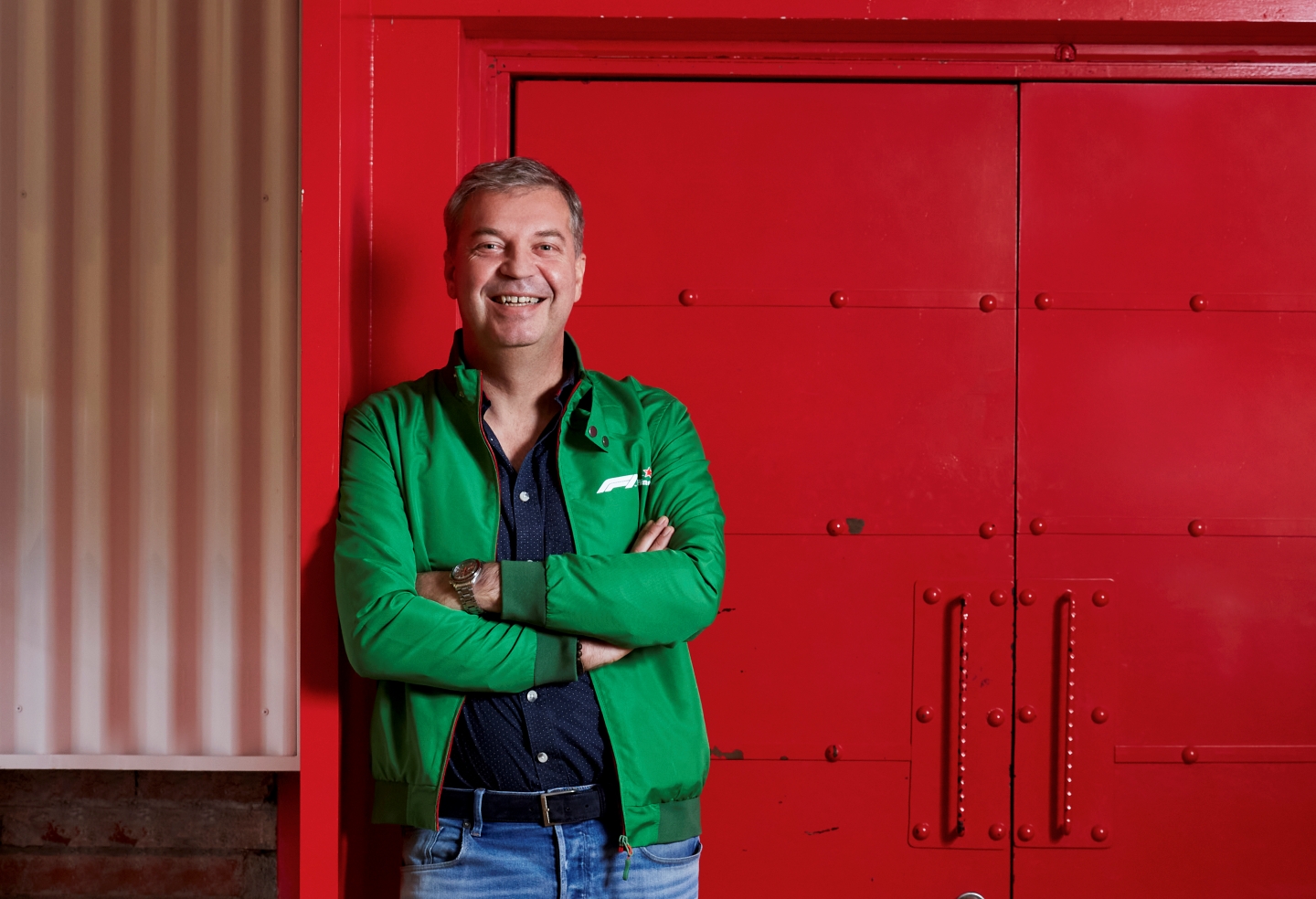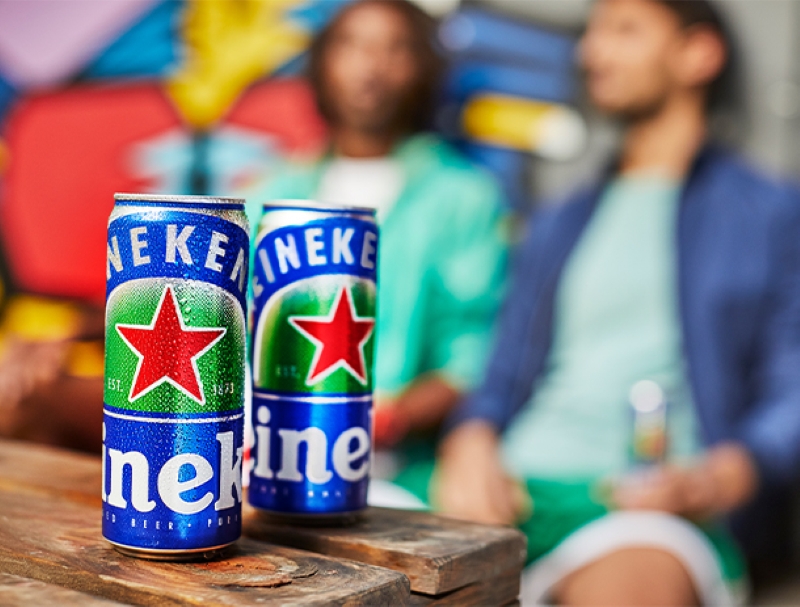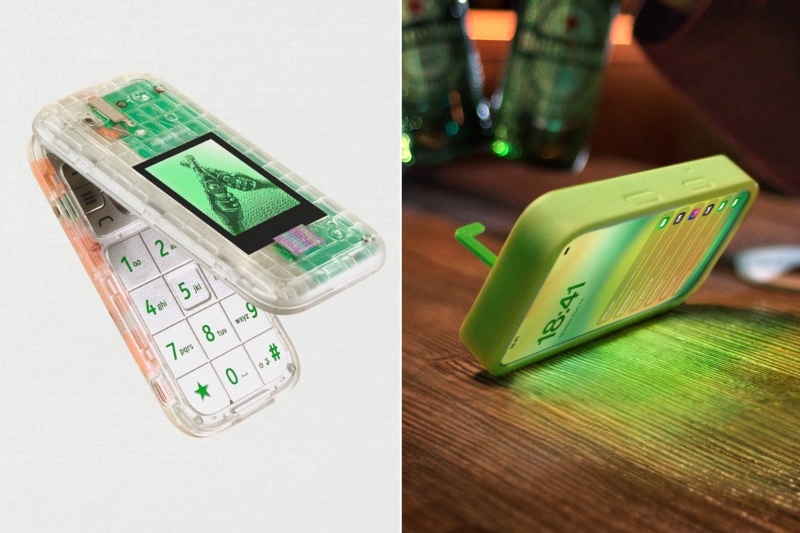
The diversification of products is Heineken's key to conquering the beverage industry (Photo: SooPhye)
The introduction of zythology, or the study of beer and beer making, began at the dawn of human civilisation. Its earliest discovery dates back to the Neolithic period in Mesopotamia, a historical region in the Middle Eastern Fertile Crescent where hunter-gatherers were first noted to transition into settled agricultural communities due to the domestication of wild cereals.
Anthropologists can only make an educated guess, but beer was most likely discovered by happenstance. People realised that when the wild grains got wet — possibly after a sudden shower — they would ferment, turning the water into a thick dark liquid. A brave soul simply sampled the brew, found it delicious and most importantly, did not perish.
The beverage quickly became an essential part of everyday life. One of the first recorded evidences of its enjoyment was a pictogram dated 4000 BCE that depicted two figures imbibing the drink from a large pottery jar using reed straws, suggesting its social function among the ancients. Beer also became a widespread form of payment and currency, as recorded in the famous Code of Hammurabi, where daily rations were issued to the citizens of Babylon.
It was a staple food source for many cultures and considered a safer alternative to water due to its fermentation process. Additionally, it was used in religious ceremonies and offered to the divine. In fact, what is believed to be the first written brewing recipe is extracted from the Hymn of Ninkasi (circa 1800 BCE). Etched into clay tablets, the poem was an ode to the Sumerian goddess of beer.
Brewing techniques evolved across millennia. Ascetic monks refined the process in European monasteries during the Middle Ages; the introduction of Reinheitsgebot, or the German Beer Purity Law, in 1516 regulated production; and the Industrial Revolution allowed for large-scale manufacturing and wider distribution, fundamentally changing how the liquid gold was made and consumed globally.
But a few things remain: its potent symbolism for community and social connection, its significant role in celebrations and rituals, and its historical position as a drink for the common man (unlike the often exclusive nature of wine), fostering a mutual interest across different social classes.
That accessibility and broad appeal are certainly still characteristics of beer culture today, agrees Martijn Rene van Keulen, managing director of Heineken Malaysia. “People are united over a beer. It’s a great way to celebrate success or overcome difficult topics. More than just a social lubricant, it is a good way of sharing emotion,” he says. “As a brewer, we want to be part of that conversation.”
copy_of_photo_7_-_heineken_malaysia_commercial_conference_group_photo.jpg

World on tap
In the dynamic landscape of global beverage marketing, few stories capture the essence of modern leadership like the career trajectory of this Heineken executive, who has been with the company for 25 years. Spanning Europe to Asia, his journey is a masterclass in adaptability, drive and strategic thinking.
The Dutchman started his career with Heineken in 2000, where he cultivated his expertise through commercial roles before a four-year tenure as global account manager for the duty-free and travel retail sector. “In duty-free, you manage different route-to-markets for different countries. When I moved to Heineken Netherlands, transitioning from scattered distribution models and diverse cultures to just one and in your home country was a good but challenging experience.”
It would be the last time he would be based in native soil. Van Keulen soon moved to Japan to head a joint venture with Kirin. “Japan was fantastic,” he recalls fondly. “If you love food, it’s a dream. But it also comes with a lot of challenges because the working culture is completely different from Europe’s. When it comes to business, it’s all about preparation, alignment and no unexpected things happening in meetings. In Europe, most people tend to do things at the last minute and adjust.”
Aside from language, there was also the need to navigate nemawashi, or “going around the roots”, the informal process of building consensus through shadow meetings. “A lot of decisions were made after hours when people would talk more freely. It was important to read facial expressions because you can’t rely purely on verbal communication.”
After three years, Van Keulen was whisked away to New Caledonia. Three hours from Auckland and Sydney, the semi-autonomous French territory in the Pacific was “quite a paradise” despite the tension between the French and indigenous Kanak communities. “Heineken has a super interesting business there: we have a brewery, we do soft drinks and we own two water companies. So for me as a general manager, it was interesting to expand my view from off-trade and distribution to a joint venture in Japan, and then to a full-fledged operation where I was also responsible for categories that are competitors of beer.”
Two years later, an offer to relocate to Myanmar came. Spurred by its unique landscape and the professional challenge of boosting growth in a developing market, Van Keulen and his family made the move during Covid-19. “The pandemic was unprecedented for everybody, but at the beginning of 2021, they announced the coup d’état. The military took over the ruling of the country again and detained former leader Aung San Suu Kyi.
“It was a roller coaster for us as a family, and also for the people of Myanmar and our employees. We went through extreme highs and lows, but one thing that really stood out to me from that experience is you need to take care of people. Because, if they are not in a good place mentally, no matter how hard you push, the result will be the reverse. Together, we as the management team set very clear rules on how to engage with our employees while meeting challenging business objectives. That played out really well for us. We had very good results over four years and were able to grow market share and value as well as future-fit our operations.
“That experience toughened me up. It also points back to my own beliefs that people, authenticity and leadership are vital to building a resilient company culture.”
copy_of_photo_6_-_martijn_van_keulen_managing_director_of_heineken_malaysia_at_the_tiger_together_we_roar_chinese_new_year_2025_event.jpg

Crafted for connection
In July last year, Van Keulen officially settled in Malaysia, a country that has always intrigued him. “I think it’s an extraordinary place. Nature is stunning. You can do and find anything here. From a political and economic point of view, Malaysia has a huge growth opportunity. I find Kuala Lumpur a mix of both Bangkok and Singapore, in addition to its geographical position between them. The city’s got that quirkiness and roughness like Bangkok but a huge part of it is structural like Singapore. Plus, it’s interesting to see the cultural difference between the [Malaysian] states and how people try to move the country forward.”
He has travelled around the country extensively, from work trips to major cities to holidays in the East Coast, but East Malaysia is a personal favourite. “I love the spirit in Sarawak and Sabah. They have a different vibe from what you experience in the peninsula. The variety of cultural and historical aspects combined with nature are what really make this country unique.”
But what of the beer market here? Change is constant when it comes to consumer preferences but Van Keulen notes that the data shows a predilection for different flavours, healthy alternatives and responsible drinking among the younger demographic.
“The traditional drinkers were not easier per se, but they were brought up with a more bitter taste,” he elaborates. “If you look at the diet of most kids, they are brought up with more sweetness in general by FMCG (fast-moving consumer goods). So we need to see how we can play in that arena because there’s a huge interest from all generations in our product, just that some prefer something more fruity or less bitter while others like it original.
“If you look at global consumer trends, people are definitely more conscious of how they consume alcohol and its impact on their lifestyle. So from the company’s perspective, we’re very much focused on growing the category and, with that, our own share as well.”
copy_of_photo_3_-_solar_panels_at_heineken_malaysia_brewerys_rooftop_with_tiger_heineken_guinness_and_anchor_bottles.jpg

Heineken’s ownership of a diverse portfolio of brands certainly provides a significant advantage. For instance, beyond its flagship lager, the company also owns international brewers like Amstel, Tiger, Edelweiss and Birra Moretti, as well as local favourites Anchor and shandy brand, Anglia. This multi-label strategy allows them to cater to a wider range of consumer preferences and occasions, strengthening their overall market position.
Last year, as a response to the change in consumer tastes, Heineken Malaysia stocked the shelves with a variety of new products. Among them was Tiger Soju, which taps the rising popularity of K-Pop.
“That panned out really well for us because we had South Korean rapper G-Dragon leading the campaign,” Van Keulen says. “We also launched Edelweiss Peach, which is more of a wheat beer proposition from the Alps in Europe.” Subtly sweet, fruity and crisp, it is the perfect summer drink for lounging by the pool.
“We’re also happy we can now brew and package our Guinness Draught in a Can locally. The foreign stuff we carry here is a bit stronger. You see the uncles drink that more frequently. Guinness Draught is a unique innovation, which plays around with nitrogen gas,” he shares. When opened, the pressurised gas is released into the beer to create bubbles which rise to the surface to produce its distinctive creamy head. “Now you can have this beautiful, smooth Guinness not only at the bar, but anywhere, from the park to a barbeque or at home.”
“We’re not trying to fight within the category, but grow it,” he emphasises. “And it goes beyond product innovation because as we always say in Heineken, we don’t build products that last for 10 years, but multiple generations.”
The strategy has proven successful. According to Heineken Malaysia’s FY2024 report, they experienced a 6% increase in revenue, totalling RM2.8 billion, while net profit rose 21% to RM467 million compared with 2023.
heineken_0.0.jpg

New horizons
That said, innovation and growth are not exclusive to commercial success. Heineken’s global Evergreen Strategy details the ways in which the company is future-proofing its business. There are five priorities. The first reiterates its efforts in growing the category, extending into non-alcoholic, flavoured and less bitter variants and exploring beverages beyond beer. The second taps into funding the growth either through investments in innovation, digital transformation or driving productivity.
Then, there is raising the bar on sustainability and responsibility (SNR). Van Keulen is happy to report that Heineken Malaysia is well ahead of its journey in managing its Scope 1 and 2 emissions. The former category is used to classify direct emissions from a company’s own or controlled sources, such as production sites, logistics and offices. The latter are indirect emissions from purchased energy, including electricity, steam and cooling. The goal is to reach net zero for both by 2030.
“The other thing is community care. Water is essential to make beer, but it is also necessary for our own livelihood. We still see certain tribes or communities without access to clean water today. We’re trying to reduce our consumption in production and also collaborate with local NGOs like Hopes Malaysia to provide fresh water to these communities.”
Viewing SNR with the consumer in mind, responsible consumption is top priority.
“We invest a significant amount of money on a year-to-year basis to drive moderation,” he adds. A good example is Heineken’s “When You Drive, Never Drink” campaign, which tapped the talents of formidable father-and-son F1 champions Keke and Nico Rosberg. “It conveys a powerful message that whether you are a professional driver or not, abstinence behind the wheel is the only option,” says Rosberg junior.
Alcohol and driving should never mix, hence Heineken 0.0 comes as a suitable proposition when FOMO (fear of missing out) creeps up. “You still get to enjoy the classic taste but without the alcohol,” says Van Keulen.
Leveraging the thrill of virtual racing and global influence of ambassador Max Verstappen, the brand’s associated Player 0.0 campaign — participants who score the highest points in a racing simulator get a chance to compete with the F1 legend himself — aims to resonate with younger audiences and instil in them the right habits.
The fourth priority is the adoption of technology and digitalisation to become the best connected brewer. That means simplifying and automating end-to-end processes and ramping up e-commerce capabilities as well as data and analytics. “We want to be internally connected to our supplies and distributors, but also use the latest tech to optimise our ways of working.” Asked about the integration of artificial intelligence, Van Keulen says they are doing so where possible and reliable. “I think AI is developing very rapidly but we need to keep the balance between human capital versus artificial intelligence.”
The final priority is unlocking the full potential of its people by creating a winning culture within the workplace. “I’ve been lucky enough to work with super talented individuals from different levels of the organisation. Others have put their faith in me and that is what I strive to do as well. Good leaders care about you, but are not afraid to push you to go forward, come up with new ideas and take risks. You don’t have to be 100% sure, 80% is okay. Speed over perfection.
“Ultimately, building trust with each other and creating an environment where that is easily cultivated allows them to speak up about how they feel. Authenticity and honesty are what help form a great team.”
heineken_the_boring_phone_and_flipper_phone.jpg

Brewed for bonding
In a world where innumerable choices exist, staying ahead of the curve can be a difficult task. Van Keulen’s advice? Listen to your consumer. “At the end of the day, they make a difference at the point of purchase. So, constantly ask what are their needs and where trends are heading, and see how you can adapt to that in a reasonable time frame. It’s making short-term decisions that will make a positive impact in the long run.”
Van Keulen’s calendar is populated with events all year round. “We focus on Tiger during Chinese New Year and Guinness for the Premier League. These are fantastic platforms to unite people and create good conversations and connections.”
One of Heineken’s most memorable marketing pulls was launching The Boring Phone in collaboration with HMD (makers of the original Nokia) and American streetwear brand Bodega during last year’s Milan Design Week. These “dumb” phones were specifically designed to have reduced tech capabilities to encourage people to be present and enjoy real-life connections on their nights out. The nostalgic device only has a few essential features, so no social media, selfie camera or Netflix.
It was a big hit, but for those who could not get their hands on the 5,000 limited editions, Heineken also released The Boring Mode app, which lets users try out the dumbphone experience. The recently launched Flipper phone case is notable too. Though still a prototype, the witty mobile accessory uses an AI-trained listening tool connected to a robotic arm to flip your device around when it detects the word “cheers”.
“It’s harnessing creativity to create connection, calling out the social dilemmas so many are dealing with and addressing them with some humour,” he laughs.
Van Keulen hints at more surprises to come that will excite the market. “Innovation is not something that happens overnight, but we have proper planning to continue building our community.”
copy_of_photo_8_-_martijn_with_his_family_on_vacation_1.jpg

Hoppily ever after
The Dutchman is slowly building his own community here in KL too. On weekends, one might see him on the courts. “I play squash and tennis, and recently picked up pickleball! The job is quite intense and demanding, so I value time with my family and young kids over the weekend.”
What is his favourite drink after a long day? He replies with a cheeky but diplomatic answer: “I love the refreshing taste and variety that comes with beer, whether it’s a stout or lager. Lucky for us, we have a wide selection at home, so I can offer them to friends and family who come over. There’s no reason to jump out of it really!” he winks.
“I do also enjoy an occasional glass of wine. And after spending a few years in Japan, I’ve come to appreciate saké as well.”
The family returns to the motherland at least once a year for the kids, who are 10 and 13, to keep in touch with their grandparents and relatives. Despite having to relocate often because of dad’s job, they are enjoying exploring different parts of the world. “Of course, it still comes with the challenge of saying goodbye to friends every three years, but they remain eager. We check in with them, ask if they’re okay and if they still want to continue. So far, the answer has been, ‘We love it as long as we go back to the Netherlands now and then’.
“We hope they grow up as global citizens and can appreciate different cultures and lifestyles. And the experience creates agility and resilience within them.”
Van Keulen is already collecting many fond memories in Malaysia, recalling a trip to Langkawi with the brood. “It was 6pm in the evening. We ended up on a small beach and the kids were playing sports. There were bean bags around and my wife Helen and I settled into them, cracked a cold Tiger and talked into the evening. That is the life, isn’t it?”
We could not agree more.
This article first appeared on Apr 28, 2025 in The Edge Malaysia.


